Deck 7: Quantum Theory and the Electronic Structure of Atoms
Question
Question
Question
Question
Question
Question
Question
Question
Question
Question
Question
Question
Question
Question
Question
Question
Question
Question
Question
Question
Question
Question
Question
Question
Question
Question
Question
Question
Question
Question
Question
Question
Question
Question
Question
Question
Question
Question
Question
Question
Question
Question
Question
Question
Question
Question
Question
Question
Question
Question
Question
Question
Question
Question
Question
Question
Question
Question
Question
Question
Question
Question
Question
Question
Question
Question
Question
Question
Question
Question
Question
Question
Question
Question
Question
Question
Question
Question
Question
Question

Unlock Deck
Sign up to unlock the cards in this deck!
Unlock Deck
Unlock Deck
1/136
Play
Full screen (f)
Deck 7: Quantum Theory and the Electronic Structure of Atoms
1
What is the wavelength of radiation that has a frequency of 5.39 × 1014 s-1? (c = 2.9979 × 108 m/s)
A)1.80 × 10-3 nm
B)556 nm
C)618 nm
D)6180 nm
E)1.61 × 1023 nm
A)1.80 × 10-3 nm
B)556 nm
C)618 nm
D)6180 nm
E)1.61 × 1023 nm
556 nm
2
Calculate the wavelength, in nanometers, of the light emitted by a hydrogen atom when its electron falls from the n = 7 to the n = 4 principal energy level.Recall that the energy levels of the H atom are given by En = -2.18 × 10-18 J(1/n2)
A)9.18 × 10-20 nm
B)4.45 × 10-20 nm
C)2.16 × 10-6 nm
D)2.16 × 103 nm
E)1.38 × 1014 nm
A)9.18 × 10-20 nm
B)4.45 × 10-20 nm
C)2.16 × 10-6 nm
D)2.16 × 103 nm
E)1.38 × 1014 nm
2.16 × 103 nm
3
Using the figure below, categorize electromagnetic radiation with a wavelength of 1.0 x 10-1 m. 
A)Gamma rays
B)X rays
C)Ultraviolet
D)Infrared
E)Microwave

A)Gamma rays
B)X rays
C)Ultraviolet
D)Infrared
E)Microwave
Microwave
4
Using the figure below, categorize electromagnetic radiation with an energy of 6.6 x 10-16 J/photon. 
A)Gamma rays
B)X rays
C)Ultraviolet
D)Infrared
E)Microwave

A)Gamma rays
B)X rays
C)Ultraviolet
D)Infrared
E)Microwave

Unlock Deck
Unlock for access to all 136 flashcards in this deck.
Unlock Deck
k this deck
5
Calculate the energy, in joules, required to excite a hydrogen atom by causing an electronic transition from the n = 1 to the n = 4 principal energy level.Recall that the energy levels of the H atom are given by En = -2.18 × 10-18 J(1/n2)
A)2.07 × 10-29 J
B)2.25 × 10-18 J
C)2.04 × 10-18 J
D)3.27 × 10-17 J
E)2.19 × 105 J
A)2.07 × 10-29 J
B)2.25 × 10-18 J
C)2.04 × 10-18 J
D)3.27 × 10-17 J
E)2.19 × 105 J

Unlock Deck
Unlock for access to all 136 flashcards in this deck.
Unlock Deck
k this deck
6
Calculate the frequency of the light emitted by a hydrogen atom during a transition of its electron from the n = 6 to the n = 3 principal energy level.Recall that for hydrogen En = -2.18 × 10-18 J(1/n2).
A)1.82 × 10-19 /s
B)9.13 × 1013 /s
C)2.74 × 1014/s
D)3.65 × 1014 /s
E)1.64 × 1015 /s
A)1.82 × 10-19 /s
B)9.13 × 1013 /s
C)2.74 × 1014/s
D)3.65 × 1014 /s
E)1.64 × 1015 /s

Unlock Deck
Unlock for access to all 136 flashcards in this deck.
Unlock Deck
k this deck
7
Which of the following frequencies of light has the highest energy?
A)2.5 x 1010 s-1
B)7.0 x 1013 s-1
C)2.3 x 1014 s-1
D)5.0 x 1014 s-1
E)1.4 x 1015 s-1
A)2.5 x 1010 s-1
B)7.0 x 1013 s-1
C)2.3 x 1014 s-1
D)5.0 x 1014 s-1
E)1.4 x 1015 s-1

Unlock Deck
Unlock for access to all 136 flashcards in this deck.
Unlock Deck
k this deck
8
Using the figure below, categorize electromagnetic radiation with an energy of 6.7 x 10-18 J/photon. 
A)Gamma rays
B)X rays
C)Ultraviolet
D)Infrared
E)Microwave

A)Gamma rays
B)X rays
C)Ultraviolet
D)Infrared
E)Microwave

Unlock Deck
Unlock for access to all 136 flashcards in this deck.
Unlock Deck
k this deck
9
Calculate the frequency of the light emitted by a hydrogen atom during a transition of its electron from the n = 4 to the n = 1 principal energy level.Recall that for hydrogen En = -2.18 × 10 -18 J(1/n2)
A)1.35 × 10-51 /s
B)1.03 × 108 /s
C)2.06 × 1014 /s
D)8.22 × 1014 /s
E)3.08 × 1015 /s
A)1.35 × 10-51 /s
B)1.03 × 108 /s
C)2.06 × 1014 /s
D)8.22 × 1014 /s
E)3.08 × 1015 /s

Unlock Deck
Unlock for access to all 136 flashcards in this deck.
Unlock Deck
k this deck
10
What is the energy in joules of a mole of photons associated with visible light of wavelength 486 nm?
A)6.46 × 10-25 J
B)6.46 × 10-16 J
C)2.46 × 10-4 J
D)12.4 kJ
E)246 kJ
A)6.46 × 10-25 J
B)6.46 × 10-16 J
C)2.46 × 10-4 J
D)12.4 kJ
E)246 kJ

Unlock Deck
Unlock for access to all 136 flashcards in this deck.
Unlock Deck
k this deck
11
Calculate the frequency of visible light having a wavelength of 686 nm.
A)4.37 × 1014 /s
B)4.37 × 105 /s
C)6.17 × 1014 /s
D)2.29 × 10-15 /s
E)2.29 × 10-6 /s
A)4.37 × 1014 /s
B)4.37 × 105 /s
C)6.17 × 1014 /s
D)2.29 × 10-15 /s
E)2.29 × 10-6 /s

Unlock Deck
Unlock for access to all 136 flashcards in this deck.
Unlock Deck
k this deck
12
What is the energy in joules of one photon of x-ray radiation with a wavelength of 0.120 nm?
A)2.50 x 109 J
B)1.66 x 10-24 J
C)1.66 x 10-33 J
D)2.50 x 1018J
E)1.66 x 10-15J
A)2.50 x 109 J
B)1.66 x 10-24 J
C)1.66 x 10-33 J
D)2.50 x 1018J
E)1.66 x 10-15J

Unlock Deck
Unlock for access to all 136 flashcards in this deck.
Unlock Deck
k this deck
13
What is the energy in joules of a mole of photons associated with red light of wavelength 7.00 × 102 nm?
A)4.72 × 10-43 J
B)1.71 × 105 J
C)12.4 kJ
D)256 kJ
E)2.12 × 1042 J
A)4.72 × 10-43 J
B)1.71 × 105 J
C)12.4 kJ
D)256 kJ
E)2.12 × 1042 J

Unlock Deck
Unlock for access to all 136 flashcards in this deck.
Unlock Deck
k this deck
14
Which of the following wavelengths of electromagnetic radiation has the highest energy?
A)450.nm
B)225 nm
C)3.50 x 10-9 m
D)8.40 x 10-7 m
E)2.50 x 10-5 m
A)450.nm
B)225 nm
C)3.50 x 10-9 m
D)8.40 x 10-7 m
E)2.50 x 10-5 m

Unlock Deck
Unlock for access to all 136 flashcards in this deck.
Unlock Deck
k this deck
15
Calculate the frequency of visible light having a wavelength of 486 nm.
A)2.06 × 1014 /s
B)2.06 × 106 /s
C)6.17 × 1014 /s
D)1.20 × 10-15 /s
E)4.86 × 10-7 /s
A)2.06 × 1014 /s
B)2.06 × 106 /s
C)6.17 × 1014 /s
D)1.20 × 10-15 /s
E)4.86 × 10-7 /s

Unlock Deck
Unlock for access to all 136 flashcards in this deck.
Unlock Deck
k this deck
16
What is the binding energy (in J/mol or kJ/mol)of an electron in a metal whose threshold frequency for photoelectrons is 2.50 × 1014 /s?
A)2.75 × 10-43 J/mol
B)1.66 × 10-19 J/mol
C)1.20 × 10-6 J/mol
D)99.7 kJ/mol
E)7.22 × 1017 kJ/mol
A)2.75 × 10-43 J/mol
B)1.66 × 10-19 J/mol
C)1.20 × 10-6 J/mol
D)99.7 kJ/mol
E)7.22 × 1017 kJ/mol

Unlock Deck
Unlock for access to all 136 flashcards in this deck.
Unlock Deck
k this deck
17
Using the figure below, categorize electromagnetic radiation with a wavelength of 1.0 x 10-3 m. 
A)Gamma rays
B)X rays
C)Ultraviolet
D)Infrared
E)Microwave

A)Gamma rays
B)X rays
C)Ultraviolet
D)Infrared
E)Microwave

Unlock Deck
Unlock for access to all 136 flashcards in this deck.
Unlock Deck
k this deck
18
What is the energy in joules of one photon of microwave radiation with a wavelength 0.122 m? (c = 2.9979 × 108 m/s; h = 6.626 × 10-34 J.s)
A)2.70 × 10-43 J
B)5.43 × 10-33 J
C)1.63 × 10-24 J
D)4.07 × 10-10 J
E)2.46 × 109 J
A)2.70 × 10-43 J
B)5.43 × 10-33 J
C)1.63 × 10-24 J
D)4.07 × 10-10 J
E)2.46 × 109 J

Unlock Deck
Unlock for access to all 136 flashcards in this deck.
Unlock Deck
k this deck
19
In the following diagram of a wave 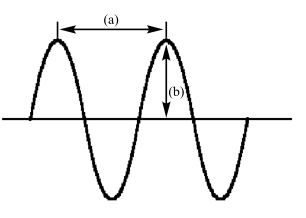
A)(a)is amplitude and (b)is wavelength
B)(a)is frequency and (b)is amplitude
C)(a)is wavelength and (b)is frequency
D)(a)is amplitude and (b)is frequency
E)(a)is wavelength and (b)is amplitude

A)(a)is amplitude and (b)is wavelength
B)(a)is frequency and (b)is amplitude
C)(a)is wavelength and (b)is frequency
D)(a)is amplitude and (b)is frequency
E)(a)is wavelength and (b)is amplitude

Unlock Deck
Unlock for access to all 136 flashcards in this deck.
Unlock Deck
k this deck
20
What is the wavelength of radiation that has a frequency of 3.4 x 1011 s -1?
A)8.8 x 10-4 nm
B)8.8 x 105 nm
C)8.8 x 10-13 nm
D)1.0 x 1011 nm
E)1.0 x 10-9 nm
A)8.8 x 10-4 nm
B)8.8 x 105 nm
C)8.8 x 10-13 nm
D)1.0 x 1011 nm
E)1.0 x 10-9 nm

Unlock Deck
Unlock for access to all 136 flashcards in this deck.
Unlock Deck
k this deck
21
A single pulse of a laser yields an average of 5.00 × 1018 photons with = 633 nm.If melting ice to water at 0°C requires 6.01 kJ/mol, what is the fewest number of laser pulses need to melt 10.0 g of ice?
A)38300
B)3830
C)3340
D)2120
E)212
A)38300
B)3830
C)3340
D)2120
E)212

Unlock Deck
Unlock for access to all 136 flashcards in this deck.
Unlock Deck
k this deck
22
The second line of the Balmer series occurs at a wavelength of 486.1 nm.What is the energy difference between the initial and final levels of the hydrogen atom in this emission process?
A)2.44 × 1018 J
B)4.09 × 10-19 J
C)4.09 × 10-22 J
D)4.09 × 10-28 J
E)1.07 × 10-48 J
A)2.44 × 1018 J
B)4.09 × 10-19 J
C)4.09 × 10-22 J
D)4.09 × 10-28 J
E)1.07 × 10-48 J

Unlock Deck
Unlock for access to all 136 flashcards in this deck.
Unlock Deck
k this deck
23
Which one of the following sets of quantum numbers represents an electron with the highest energy?
A)n = 2, l = 1, ml = 0, ms = +1/2
B)n = 3, l = 0, ml = 0, ms = -1/2
C)n = 2, l = 0, ml = 0, ms = +1/2
D)n = 3, l = 2, ml = 1, ms = -1/2
E)n = 3, l = 1, ml = 1, ms = +1/2
A)n = 2, l = 1, ml = 0, ms = +1/2
B)n = 3, l = 0, ml = 0, ms = -1/2
C)n = 2, l = 0, ml = 0, ms = +1/2
D)n = 3, l = 2, ml = 1, ms = -1/2
E)n = 3, l = 1, ml = 1, ms = +1/2

Unlock Deck
Unlock for access to all 136 flashcards in this deck.
Unlock Deck
k this deck
24
A proton is roughly 1800 times more massive than an electron.If a proton and an electron are traveling at the same speed,
A)the wavelength of the photon will be about 1800 times longer than the wavelength of the electron.
B)the wavelength of the photon will be about times longer than the wavelength of the electron.
times longer than the wavelength of the electron.
C)the wavelength of the photon will be roughly equal to the wavelength of the electron.
D)the wavelength of the electron will be about times longer than the wavelength of the photon.
times longer than the wavelength of the photon.
E)the wavelength of the electron will be about 1800 times longer than the wavelength of the photon.
A)the wavelength of the photon will be about 1800 times longer than the wavelength of the electron.
B)the wavelength of the photon will be about
 times longer than the wavelength of the electron.
times longer than the wavelength of the electron.C)the wavelength of the photon will be roughly equal to the wavelength of the electron.
D)the wavelength of the electron will be about
 times longer than the wavelength of the photon.
times longer than the wavelength of the photon.E)the wavelength of the electron will be about 1800 times longer than the wavelength of the photon.

Unlock Deck
Unlock for access to all 136 flashcards in this deck.
Unlock Deck
k this deck
25
Calculate the wavelength of the light emitted by a hydrogen atom during a transition of its electron from the n = 4 to the n = 1 principal energy level.Recall that for hydrogen En = -2.18 × 10-18 J(1/n2)
A)6.8 × 10-18 nm
B)0.612 nm
C)82.6 nm
D)97.2 nm
E)365 nm
A)6.8 × 10-18 nm
B)0.612 nm
C)82.6 nm
D)97.2 nm
E)365 nm

Unlock Deck
Unlock for access to all 136 flashcards in this deck.
Unlock Deck
k this deck
26
Which one of the following sets of quantum numbers represents an electron with the highest energy?
A)n = 3, l = 2, ml = -2, ms = +1/2
B)n = 4, l = 1, ml = 0, ms = -1/2
C)n = 4, l = 0, ml = 0, ms = +1/2
D)n = 5, l = 0, ml = 0, ms = +1/2
E)n = 4, l = 2, ml = -1, ms = -1/2
A)n = 3, l = 2, ml = -2, ms = +1/2
B)n = 4, l = 1, ml = 0, ms = -1/2
C)n = 4, l = 0, ml = 0, ms = +1/2
D)n = 5, l = 0, ml = 0, ms = +1/2
E)n = 4, l = 2, ml = -1, ms = -1/2

Unlock Deck
Unlock for access to all 136 flashcards in this deck.
Unlock Deck
k this deck
27
A photon is roughly 1800 times more massive than an electron.If a proton and an electron have the same kinetic energy,
A)the wavelength of the photon will be about 1800 times longer than the wavelength of the electron.
B)the wavelength of the photon will be about times longer than the wavelength of the electron.
times longer than the wavelength of the electron.
C)the wavelength of the photon will be roughly equal to the wavelength of the electron.
D)the wavelength of the electron will be about times longer than the wavelength of the photon.
times longer than the wavelength of the photon.
E)the wavelength of the electron will be about 1800 times longer than the wavelength of the photon.
A)the wavelength of the photon will be about 1800 times longer than the wavelength of the electron.
B)the wavelength of the photon will be about
 times longer than the wavelength of the electron.
times longer than the wavelength of the electron.C)the wavelength of the photon will be roughly equal to the wavelength of the electron.
D)the wavelength of the electron will be about
 times longer than the wavelength of the photon.
times longer than the wavelength of the photon.E)the wavelength of the electron will be about 1800 times longer than the wavelength of the photon.

Unlock Deck
Unlock for access to all 136 flashcards in this deck.
Unlock Deck
k this deck
28
List the following sets of quantum numbers in order of increasing energy: I.n = 4, l = 0, ml = 0, ms = -1/2
II.n = 4, l = 2, ml = -1, ms = -1/2
III.n = 5, l = 0, ml = 0, ms = +1/2
A)I < II < III
B)II < III < I
C)III < II < I
D)I < III < II
E)III < I < II
II.n = 4, l = 2, ml = -1, ms = -1/2
III.n = 5, l = 0, ml = 0, ms = +1/2
A)I < II < III
B)II < III < I
C)III < II < I
D)I < III < II
E)III < I < II

Unlock Deck
Unlock for access to all 136 flashcards in this deck.
Unlock Deck
k this deck
29
In an electron microscope, electrons are accelerated to great velocities.Calculate the wavelength of an electron traveling with a velocity of 7.0 × 103 kilometers per second.The mass of an electron is 9.1 × 10-28 g.
A)1.0 × 10-13 m
B)1.0 × 10-10 m
C)1.0 × 10-7 m
D)1.0 m
A)1.0 × 10-13 m
B)1.0 × 10-10 m
C)1.0 × 10-7 m
D)1.0 m

Unlock Deck
Unlock for access to all 136 flashcards in this deck.
Unlock Deck
k this deck
30
The longest wavelength of light that causes electrons to be ejected from the surface of a copper plate is 243 nm.What is the maximum velocity of the electrons ejected when light of wavelength 200.nm shines on a copper plate?
A)1.97 × 104 m/s
B)4.67 × 104 m/s
C)6.22 × 105 m/s
D)1.34 × 106 m/s
E)1.48 × 106 m/s
A)1.97 × 104 m/s
B)4.67 × 104 m/s
C)6.22 × 105 m/s
D)1.34 × 106 m/s
E)1.48 × 106 m/s

Unlock Deck
Unlock for access to all 136 flashcards in this deck.
Unlock Deck
k this deck
31
Which one of the following sets of quantum numbers is not possible? 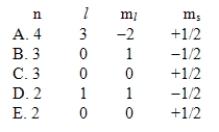
A)A
B)B
C)C
D)D
E)E

A)A
B)B
C)C
D)D
E)E

Unlock Deck
Unlock for access to all 136 flashcards in this deck.
Unlock Deck
k this deck
32
Electrons can be used to probe the arrangement of atoms on a solid surface if the wavelength of the electrons is comparable with the spacing between the atoms.Which of the following electron velocities would be appropriate for use in this application if the atoms are separated by 0.320 nm?
A)1.24 × 103 m/s
B)8.06 × 103 m/s
C)2.27 × 106 m/s
D)4.41 × 106 m/s
E)3.00 × 108 m/s
A)1.24 × 103 m/s
B)8.06 × 103 m/s
C)2.27 × 106 m/s
D)4.41 × 106 m/s
E)3.00 × 108 m/s

Unlock Deck
Unlock for access to all 136 flashcards in this deck.
Unlock Deck
k this deck
33
List the following sets of quantum numbers in order of increasing energy: I.n = 4, l = 1, ml = 1, ms = +1/2
II.n = 3, l = 2, ml = -1, ms = +1/2
III.n = 4, l = 0, ml = 0, ms = +1/2
A)I < II < III
B)II < III < I
C)III < II < I
D)I < III < II
E)III < I < II
II.n = 3, l = 2, ml = -1, ms = +1/2
III.n = 4, l = 0, ml = 0, ms = +1/2
A)I < II < III
B)II < III < I
C)III < II < I
D)I < III < II
E)III < I < II

Unlock Deck
Unlock for access to all 136 flashcards in this deck.
Unlock Deck
k this deck
34
If a hydrogen atom and a helium atom are traveling at the same speed,
A)the wavelength of the hydrogen atom will be about 4 times longer than the wavelength of the helium atom.
B)the wavelength of the hydrogen atom will be about 2 times longer than the wavelength of the helium.
C)the wavelength of the hydrogen atom will be roughly equal to the wavelength of the helium atom.
D)the wavelength of the helium atom will be about 2 times longer than the wavelength of the hydrogen atom.
E)the wavelength of the helium atom will be about 4 times longer than the wavelength of the hydrogen atom.
A)the wavelength of the hydrogen atom will be about 4 times longer than the wavelength of the helium atom.
B)the wavelength of the hydrogen atom will be about 2 times longer than the wavelength of the helium.
C)the wavelength of the hydrogen atom will be roughly equal to the wavelength of the helium atom.
D)the wavelength of the helium atom will be about 2 times longer than the wavelength of the hydrogen atom.
E)the wavelength of the helium atom will be about 4 times longer than the wavelength of the hydrogen atom.

Unlock Deck
Unlock for access to all 136 flashcards in this deck.
Unlock Deck
k this deck
35
If a hydrogen atom and a helium atom have the same kinetic energy,
A)the wavelength of the hydrogen atom will be about 4 times longer than the wavelength of the helium atom.
B)the wavelength of the hydrogen atom will be about 2 times longer than the wavelength of the helium.
C)the wavelength of the hydrogen atom will be roughly equal to the wavelength of the helium atom.
D)the wavelength of the helium atom will be about 2 times longer than the wavelength of the hydrogen atom.
E)the wavelength of the helium atom will be about 4 times longer than the wavelength of the hydrogen atom.
A)the wavelength of the hydrogen atom will be about 4 times longer than the wavelength of the helium atom.
B)the wavelength of the hydrogen atom will be about 2 times longer than the wavelength of the helium.
C)the wavelength of the hydrogen atom will be roughly equal to the wavelength of the helium atom.
D)the wavelength of the helium atom will be about 2 times longer than the wavelength of the hydrogen atom.
E)the wavelength of the helium atom will be about 4 times longer than the wavelength of the hydrogen atom.

Unlock Deck
Unlock for access to all 136 flashcards in this deck.
Unlock Deck
k this deck
36
When photons with a wavelength of 310.nm strike a magnesium plate, the maximum velocity of the ejected electrons is 3.45 × 105 m/s.Calculate the binding energy of electrons to the magnesium surface.
A)32.7 kJ/mol
B)321 kJ/mol
C)353 kJ/mol
D)386 kJ/mol
E)419 kJ/mol
A)32.7 kJ/mol
B)321 kJ/mol
C)353 kJ/mol
D)386 kJ/mol
E)419 kJ/mol

Unlock Deck
Unlock for access to all 136 flashcards in this deck.
Unlock Deck
k this deck
37
Calculate the wavelength associated with a 20Ne+ ion moving at a velocity of 2.0 × 105 m/s.The atomic mass of 20Ne is 19.992 amu.
A)1.7 x 10-40 m
B)1.0 × 10-18 m
C)1.0 × 10-16 m
D)1.0 × 10-13 m
E)9.7 × 1012 m
A)1.7 x 10-40 m
B)1.0 × 10-18 m
C)1.0 × 10-16 m
D)1.0 × 10-13 m
E)9.7 × 1012 m

Unlock Deck
Unlock for access to all 136 flashcards in this deck.
Unlock Deck
k this deck
38
A common way of initiating certain chemical reactions with light involves the generation of free halogen atoms in solution.If H for the reaction Cl2(g) 2Cl(g)is 242.8 kJ/mol, what is the longest wavelength of light that will produce free chlorine atoms in solution?
A)246.3 nm
B)349.3 nm
C)465.2 nm
D)492.6 nm
E)698.6 nm
A)246.3 nm
B)349.3 nm
C)465.2 nm
D)492.6 nm
E)698.6 nm

Unlock Deck
Unlock for access to all 136 flashcards in this deck.
Unlock Deck
k this deck
39
Which one of the following sets of quantum numbers is not possible? 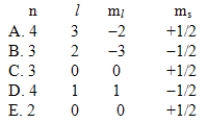
A)A
B)B
C)C
D)D
E)E

A)A
B)B
C)C
D)D
E)E

Unlock Deck
Unlock for access to all 136 flashcards in this deck.
Unlock Deck
k this deck
40
Calculate the wavelength of a neutron that has a velocity of 250 cm/s.(The mass of a neutron = 1.675 × 10-24 g)
A)1.6 pm
B)0.016 nm
C)0.16 nm
D)160 nm
E)1.6 × 10-4 m
A)1.6 pm
B)0.016 nm
C)0.16 nm
D)160 nm
E)1.6 × 10-4 m

Unlock Deck
Unlock for access to all 136 flashcards in this deck.
Unlock Deck
k this deck
41
A possible set of quantum numbers to describe an electron in a 3d subshell is
A)n = 3, l = 0, ml = 0 , ms = +1/2
B)n = 3, l = 1, ml = 0, ms = - 1/2
C)n = 3, l = 2, ml = 1, ms = +1/2
D)n = 3, l = 3, ml = 1, ms = - 1/2
E)n = 2, l = 0, ml = 0, ms = +1/2
A)n = 3, l = 0, ml = 0 , ms = +1/2
B)n = 3, l = 1, ml = 0, ms = - 1/2
C)n = 3, l = 2, ml = 1, ms = +1/2
D)n = 3, l = 3, ml = 1, ms = - 1/2
E)n = 2, l = 0, ml = 0, ms = +1/2

Unlock Deck
Unlock for access to all 136 flashcards in this deck.
Unlock Deck
k this deck
42
The orbital diagram for a ground-state oxygen atom is 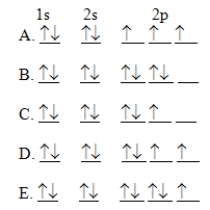
A)A
B)B
C)C
D)D
E)E

A)A
B)B
C)C
D)D
E)E

Unlock Deck
Unlock for access to all 136 flashcards in this deck.
Unlock Deck
k this deck
43
What is the maximum number of electrons in an atom that can have the following quantum numbers? n = 3 l = 2
A)18
B)10
C)5
D)2
E)1
A)18
B)10
C)5
D)2
E)1

Unlock Deck
Unlock for access to all 136 flashcards in this deck.
Unlock Deck
k this deck
44
A possible set of quantum numbers to describe an electron in a 5p subshell is
A)n = 5, l = 2, ml = 2 , ms = +1/2
B)n = 4, l = 0, ml = 0, ms = - 1/2
C)n = 5, l = 0, ml = 0, ms = +1/2
D)n = 3, l = 1, ml = 1, ms = - 1/2
E)n = 5, l = 1, ml = 0, ms = +1/2
A)n = 5, l = 2, ml = 2 , ms = +1/2
B)n = 4, l = 0, ml = 0, ms = - 1/2
C)n = 5, l = 0, ml = 0, ms = +1/2
D)n = 3, l = 1, ml = 1, ms = - 1/2
E)n = 5, l = 1, ml = 0, ms = +1/2

Unlock Deck
Unlock for access to all 136 flashcards in this deck.
Unlock Deck
k this deck
45
The orbital diagram for a ground-state nitrogen atom is 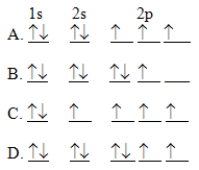
A)A
B)B
C)C
D)D

A)A
B)B
C)C
D)D

Unlock Deck
Unlock for access to all 136 flashcards in this deck.
Unlock Deck
k this deck
46
The orbital diagram for a ground state carbon atom is 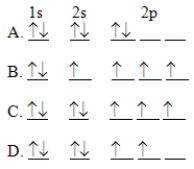
A)A
B)B
C)C
D)D

A)A
B)B
C)C
D)D

Unlock Deck
Unlock for access to all 136 flashcards in this deck.
Unlock Deck
k this deck
47
What is the maximum number of electrons in an atom that can have the following set of quantum numbers? n = 3 l = 2 ml = -2
A)18
B)10
C)5
D)2
E)1
A)18
B)10
C)5
D)2
E)1

Unlock Deck
Unlock for access to all 136 flashcards in this deck.
Unlock Deck
k this deck
48
What is the maximum number of electrons in an atom that can have the following set of quantum numbers? n = 4 l = 3 ml = -2 ms = +1/2
A)0
B)1
C)2
D)6
E)10
A)0
B)1
C)2
D)6
E)10

Unlock Deck
Unlock for access to all 136 flashcards in this deck.
Unlock Deck
k this deck
49
How many orbitals are allowed in a subshell if l = 3?
A)1
B)3
C)5
D)7
E)9
A)1
B)3
C)5
D)7
E)9

Unlock Deck
Unlock for access to all 136 flashcards in this deck.
Unlock Deck
k this deck
50
Which of the following electronic transitions is consistent with an increase in energy?
A)From a 4s subshell to a 3d subshell
B)From a 5p subshell to a 4d subshell
C)From a 4d subshell to a 5s subshell
D)From a 4f subshell to a 6s subshell
E)From a 5d subshell to a 6s subshell
A)From a 4s subshell to a 3d subshell
B)From a 5p subshell to a 4d subshell
C)From a 4d subshell to a 5s subshell
D)From a 4f subshell to a 6s subshell
E)From a 5d subshell to a 6s subshell

Unlock Deck
Unlock for access to all 136 flashcards in this deck.
Unlock Deck
k this deck
51
Electrons in an orbital with l = 3 are in a/an
A)d orbital.
B)f orbital.
C)g orbital.
D)p orbital.
E)s orbital.
A)d orbital.
B)f orbital.
C)g orbital.
D)p orbital.
E)s orbital.

Unlock Deck
Unlock for access to all 136 flashcards in this deck.
Unlock Deck
k this deck
52
Which ground-state atom has an electron configuration described by the following orbital diagram? 
A)phosphorus
B)germanium
C)selenium
D)tellurium
E)none of these

A)phosphorus
B)germanium
C)selenium
D)tellurium
E)none of these

Unlock Deck
Unlock for access to all 136 flashcards in this deck.
Unlock Deck
k this deck
53
How many orbitals are allowed in a subshell if l = 2?
A)1
B)3
C)5
D)7
E)9
A)1
B)3
C)5
D)7
E)9

Unlock Deck
Unlock for access to all 136 flashcards in this deck.
Unlock Deck
k this deck
54
Which of the following electronic transitions is consistent with a decrease in energy?
A)From a 5s subshell to a 4d subshell
B)From a 4f subshell to a 5p subshell
C)From a 6s subshell to a 5d subshell
D)From a 5s subshell to a 5p subshell
E)From a 4f subshell to a 6p subshell
A)From a 5s subshell to a 4d subshell
B)From a 4f subshell to a 5p subshell
C)From a 6s subshell to a 5d subshell
D)From a 5s subshell to a 5p subshell
E)From a 4f subshell to a 6p subshell

Unlock Deck
Unlock for access to all 136 flashcards in this deck.
Unlock Deck
k this deck
55
"No two electrons in an atom can have the same four quantum numbers" is a statement of
A)the Pauli exclusion principle.
B)Bohr's equation.
C)Hund's rule.
D)de Broglie's relation.
E)Dalton's atomic theory.
A)the Pauli exclusion principle.
B)Bohr's equation.
C)Hund's rule.
D)de Broglie's relation.
E)Dalton's atomic theory.

Unlock Deck
Unlock for access to all 136 flashcards in this deck.
Unlock Deck
k this deck
56
What is the maximum number of electrons in an atom that can have the following quantum numbers? n = 3 l = 1
A)18
B)6
C)3
D)2
E)1
A)18
B)6
C)3
D)2
E)1

Unlock Deck
Unlock for access to all 136 flashcards in this deck.
Unlock Deck
k this deck
57
What is the maximum number of electrons in an atom that can have the following set of quantum numbers? n = 3 l = 1 ml = -1
A)18
B)6
C)3
D)2
E)1
A)18
B)6
C)3
D)2
E)1

Unlock Deck
Unlock for access to all 136 flashcards in this deck.
Unlock Deck
k this deck
58
A possible set of quantum numbers for the last electron added to complete an atom of germanium (Ge)in its ground state is 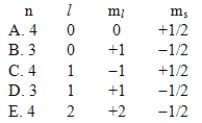
A)A
B)B
C)C
D)D
E)E

A)A
B)B
C)C
D)D
E)E

Unlock Deck
Unlock for access to all 136 flashcards in this deck.
Unlock Deck
k this deck
59
A possible set of quantum numbers to describe an electron in a 4s subshell is
A)n = 4, l = 0, ml = 1 , ms = +1/2
B)n = 4, l = 0, ml = 0, ms = - 1/2
C)n = 4, l = 1, ml = 1, ms = +1/2
D)n = 3, l = 1, ml = 1, ms = - 1/2
E)n = 3, l = 0, ml = 0, ms = +1/2
A)n = 4, l = 0, ml = 1 , ms = +1/2
B)n = 4, l = 0, ml = 0, ms = - 1/2
C)n = 4, l = 1, ml = 1, ms = +1/2
D)n = 3, l = 1, ml = 1, ms = - 1/2
E)n = 3, l = 0, ml = 0, ms = +1/2

Unlock Deck
Unlock for access to all 136 flashcards in this deck.
Unlock Deck
k this deck
60
A possible set of quantum numbers for the last electron added to complete an atom of gallium (Ga)in its ground state is 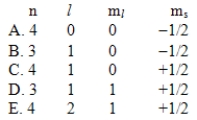
A)A
B)B
C)C
D)D
E)E

A)A
B)B
C)C
D)D
E)E

Unlock Deck
Unlock for access to all 136 flashcards in this deck.
Unlock Deck
k this deck
61
Which ground-state atom has an electron configuration described by the following orbital diagram? 
A)antimony
B)germanium
C)indium
D)lead
E)tin

A)antimony
B)germanium
C)indium
D)lead
E)tin

Unlock Deck
Unlock for access to all 136 flashcards in this deck.
Unlock Deck
k this deck
62
How many unpaired electrons does an atom of sulfur have in its ground state?
A)0
B)1
C)2
D)3
E)4
A)0
B)1
C)2
D)3
E)4

Unlock Deck
Unlock for access to all 136 flashcards in this deck.
Unlock Deck
k this deck
63
The electron configuration of a ground-state vanadium atom is
A)[Ar]4s24d3
B)[Ar]4s24p3
C)[Ar]4s23d3
D)[Ar]3d5
A)[Ar]4s24d3
B)[Ar]4s24p3
C)[Ar]4s23d3
D)[Ar]3d5

Unlock Deck
Unlock for access to all 136 flashcards in this deck.
Unlock Deck
k this deck
64
A ground-state atom of vanadium has ___ unpaired electrons and is _____.
A)0, diamagnetic
B)2, diamagnetic
C)3, paramagnetic
D)5, paramagnetic
E)4, diamagnetic
A)0, diamagnetic
B)2, diamagnetic
C)3, paramagnetic
D)5, paramagnetic
E)4, diamagnetic

Unlock Deck
Unlock for access to all 136 flashcards in this deck.
Unlock Deck
k this deck
65
The electron configuration of a ground-state copper atom is
A)[Ar]4s24d4
B)[Ar]4s24p63d3
C)[Ar]4s23d9
D)[Ar]3d9
E)[Ar]4s13d10
A)[Ar]4s24d4
B)[Ar]4s24p63d3
C)[Ar]4s23d9
D)[Ar]3d9
E)[Ar]4s13d10

Unlock Deck
Unlock for access to all 136 flashcards in this deck.
Unlock Deck
k this deck
66
Which element has the following ground-state electron configuration? 1s22s22p63s2
A)Na
B)Mg
C)Al
D)Si
E)Ne
A)Na
B)Mg
C)Al
D)Si
E)Ne

Unlock Deck
Unlock for access to all 136 flashcards in this deck.
Unlock Deck
k this deck
67
Which ground-state atom has an electron configuration described by the following orbital diagram? 
A)phosphorus
B)nitrogen
C)arsenic
D)vanadium
E)none of these

A)phosphorus
B)nitrogen
C)arsenic
D)vanadium
E)none of these

Unlock Deck
Unlock for access to all 136 flashcards in this deck.
Unlock Deck
k this deck
68
Which of the following is the ground-state electron configuration of Pb?
A)[Xe]6s25d106p2
B)[Xe]6s26d106p2
C)[Xe]6s24f146p2
D)[Xe]6s25f146d106p2
E)[Xe]6s24f145d106p2
A)[Xe]6s25d106p2
B)[Xe]6s26d106p2
C)[Xe]6s24f146p2
D)[Xe]6s25f146d106p2
E)[Xe]6s24f145d106p2

Unlock Deck
Unlock for access to all 136 flashcards in this deck.
Unlock Deck
k this deck
69
Which element has the following ground-state electron configuration? [Xe]6s24f145d10
A)Lu
B)Cd
C)Hg
D)Lr
E)Au
A)Lu
B)Cd
C)Hg
D)Lr
E)Au

Unlock Deck
Unlock for access to all 136 flashcards in this deck.
Unlock Deck
k this deck
70
How many unpaired electrons does an atom of carbon have in its ground state?
A)0
B)1
C)2
D)3
E)4
A)0
B)1
C)2
D)3
E)4

Unlock Deck
Unlock for access to all 136 flashcards in this deck.
Unlock Deck
k this deck
71
Which element has the following ground-state electron configuration? [Xe]6s24f145d4
A)W
B)Pm
C)Mo
D)Np
E)Re
A)W
B)Pm
C)Mo
D)Np
E)Re

Unlock Deck
Unlock for access to all 136 flashcards in this deck.
Unlock Deck
k this deck
72
Which of the following is the ground-state electron configuration of Ir?
A)[Xe]6s25d7
B)[Xe]6s26d7
C)[Xe]6s24f145d7
D)[Xe]6s25f146d7
E)[Xe]4s25f146d7
A)[Xe]6s25d7
B)[Xe]6s26d7
C)[Xe]6s24f145d7
D)[Xe]6s25f146d7
E)[Xe]4s25f146d7

Unlock Deck
Unlock for access to all 136 flashcards in this deck.
Unlock Deck
k this deck
73
Which element has the following ground-state electron configuration? [Kr]5s14d5
A)Mn
B)Mo
C)Nb
D)Re
E)Tc
A)Mn
B)Mo
C)Nb
D)Re
E)Tc

Unlock Deck
Unlock for access to all 136 flashcards in this deck.
Unlock Deck
k this deck
74
Which element has the following ground-state electron configuration? [Kr]5s24d105p3
A)Sn
B)Sb
C)Pb
D)Bi
E)Te
A)Sn
B)Sb
C)Pb
D)Bi
E)Te

Unlock Deck
Unlock for access to all 136 flashcards in this deck.
Unlock Deck
k this deck
75
The ground-state electron configuration for an atom of indium is
A)[Kr]5s24p64d5
B)[Ar]4s23d104p1
C)[Ar]4s24p63d5
D)[Kr]5s25p64d5
E)[Kr]5s24d105p1
A)[Kr]5s24p64d5
B)[Ar]4s23d104p1
C)[Ar]4s24p63d5
D)[Kr]5s25p64d5
E)[Kr]5s24d105p1

Unlock Deck
Unlock for access to all 136 flashcards in this deck.
Unlock Deck
k this deck
76
Which element has the following ground-state electron configuration? [Ar]4s23d104p5
A)aresnic
B)bromine
C)iodine
D)selenium
E)tellerium
A)aresnic
B)bromine
C)iodine
D)selenium
E)tellerium

Unlock Deck
Unlock for access to all 136 flashcards in this deck.
Unlock Deck
k this deck
77
A ground-state atom of manganese has ___ unpaired electrons and is _____.
A)0, diamagnetic
B)2, diamagnetic
C)3, paramagnetic
D)5, paramagnetic
E)7, paramagnetic
A)0, diamagnetic
B)2, diamagnetic
C)3, paramagnetic
D)5, paramagnetic
E)7, paramagnetic

Unlock Deck
Unlock for access to all 136 flashcards in this deck.
Unlock Deck
k this deck
78
The electron configuration of a ground-state Co atom is
A)[Ar]4s23d7
B)1s22s22p63s23d9
C)[Ne]3s23d7
D)[Ar]4s13d5
E)[Ar]4s24d7
A)[Ar]4s23d7
B)1s22s22p63s23d9
C)[Ne]3s23d7
D)[Ar]4s13d5
E)[Ar]4s24d7

Unlock Deck
Unlock for access to all 136 flashcards in this deck.
Unlock Deck
k this deck
79
A ground-state atom of iron has ___ unpaired electrons and is _____.
A)0, diamagnetic
B)6, diamagnetic
C)3, paramagnetic
D)5, paramagnetic
E)4, paramagnetic
A)0, diamagnetic
B)6, diamagnetic
C)3, paramagnetic
D)5, paramagnetic
E)4, paramagnetic

Unlock Deck
Unlock for access to all 136 flashcards in this deck.
Unlock Deck
k this deck
80
Transition metal elements have atoms or ions with partially filled
A)s subshells.
B)p subshells.
C)d subshells.
D)f subshells.
E)g subshells.
A)s subshells.
B)p subshells.
C)d subshells.
D)f subshells.
E)g subshells.

Unlock Deck
Unlock for access to all 136 flashcards in this deck.
Unlock Deck
k this deck



